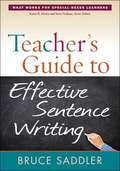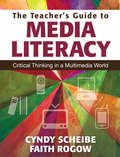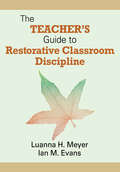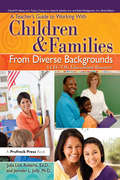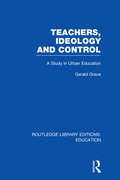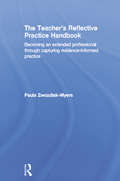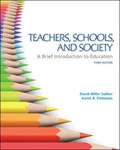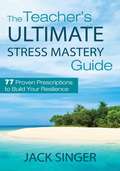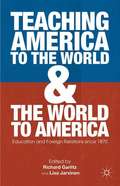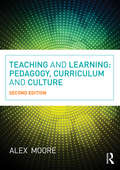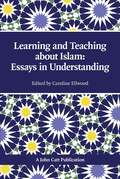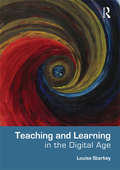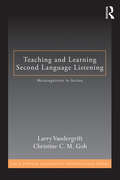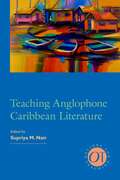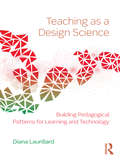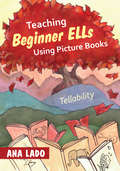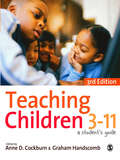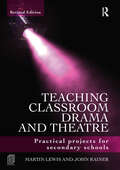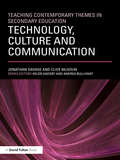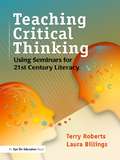- Table View
- List View
Teacher's Guide to Effective Sentence Writing
by Bruce SaddlerThis practical book provides explicit instructions for teaching sentence-level skills to students who have difficulties in this area. The author explains the key role of sentence combining in the writing process and presents effective techniques for instruction and assessment. Numerous sample lessons, practice activities, planning tips, and grammatical pointers make it easy for teachers to incorporate sentence combining and construction into the writing curriculum at all grade levels (2-12). Accessible and engaging, the book helps teachers and students experiment with different ways to arrange thoughts and produce meaningful written work.
The Teacher’s Guide to Media Literacy: Critical Thinking in a Multimedia World
by Cynthia L. Scheibe Faith RogowUse media literacy to reach all students! This book starts by asking, "What does it mean to be literate in today's world, and how can those literacy skills be developed?" The authors answer those questions by providing concrete, innovative ways to integrate media literacy across the curriculum and teach students to be independent, skilled, and reflective thinkers. Through dozens of suggested activities, teaching strategies, lessons, and a companion Website, the authors’ unique vision allows schools to: Integrate media literacy into teaching at all grade levels and core content areas Address key education standards Teach 21st-century skills and higher-order critical thinking Engage students by bridging schoolwork with their lives outside the classroom
The Teacher's Guide to Restorative Classroom Discipline
by Professor Luanna H. Meyer Dr William John EvansBuild a positive, accountable classroom environment with restorative discipline! Used together with The School Leader’s Guide to Restorative Discipline, this teacher’s guide shows how to implement a positive approach to classroom discipline based on shared expectations of behavior, contributing to consistent discipline schoolwide. The authors provide field-tested strategies for transforming classroom dynamics, with topics including: A step-by-step approach to introducing restorative discipline in your classroom Developing peer support and group problem-solving among students, including preventing bullying Partnering with families and community members Managing effective individual interventions Collaborating with administrators and staff on behavior change across the school community
A Teacher's Guide to Working With Children and Families From Diverse Backgrounds: A CEC-TAG Educational Resource
by Julia Link Roberts Jennifer JollySchools are increasingly diverse in their student population, presenting new challenges for teachers. In light of these challenges, schools remain important in the talent development process. A Teacher's Guide to Working With Children and Families From Diverse Backgrounds provides important information and strategies for educators at all levels. The book is written for educators who want all children to thrive in school, including those who are twice-exceptional, those from lower income backgrounds, and others who have been underrepresented in gifted programming.
Teachers, Ideology and Control (Routledge Library Editions: Education)
by Gerald GraceTeachers of the urban working class, especially in inner city areas, have always been regarded as strategic agents in processes of social and cultural formation. In the Victorian era, seen as ‘The Teachers of the People’, ‘Pioneers of Civilization’ and ‘Preachers of Culture’, their role in gentling and controlling the urban masses was crucial. They have always been at the centre of confrontation and struggle – in a classroom sense, in a cultural sense and in a socio-political sense. In contemporary inner city schools such confrontation and struggle remain a reality. Teachers, Ideology and Control is one of the first attempts to examine this important social and occupational group by locating contemporary sociological research in an historical framework. As such it will be of interest not only to students of sociology and education (especially urban education) but also to social historians. Its relevance to those who either administer or teach in urban schools will be clear. The author shows the ways in which contemporary inner city schools are caught up in an ideological struggle in education. He explore the nature of constraint and control in urban education with reference to existing constructs of the ‘good teacher’; the demands of the teacher’s work situation and the reality of autonomy. He suggests that, viewed historically, the relative autonomy of teachers has increased as a result largely of socio-political and institutional crises. At the same time however there have been important changes in the modality of social control, changes from more explicit to more implicit features. What it is to be a ‘good teacher’, the effects of day-to-day ‘immersion’ in school life and the ideology of professionalism- -these are all seen to be important constituents of a network of implicit control in contemporary education.
The Teacher's Reflective Practice Handbook: Becoming an Extended Professional through Capturing Evidence-Informed Practice
by Paula Zwozdiak-MyersWhat do we mean by reflective practice? What does it involve? How can it help you develop as a teacher? The Teacher’s Reflective Practice Handbook is an essential source of advice, guidance and ideas for both student and practising teachers. Helping you to translate pedagogical knowledge into practice, this Handbook guides you through studying your own teaching for personal development, evaluating your lessons through classroom research, and enhancing the quality of pupil learning. It offers an innovative framework which serves to prepare you for the challenges and complexities of the classroom environment, and supports the continuing improvement of your teaching. Underpinned by key theoretical concepts and contemporary research within the field of education, chapters help you to: systematically evaluate your teaching through classroom research procedures question personal theories and beliefs, and consider alternative perspectives and possibilities try out new strategies and ideas to maximise the learning potential of all students enhance the quality of, and continue to improve, your teaching. Including a range of reflective tasks, links to online resources, exemplification material and further reading to help you develop your own thinking, The Teacher’s Reflective Practice Handbook is an accessible guide which supports the facilitation of reflective practice through self and peer assessment, problem-based learning and personal development planning. The multi-dimensional framework enables you to build a meaningful, personally relevant portfolio of evidence-informed practice.
Teachers, Schools, And Society: A Brief Introduction To Education
by David M. Sadker Karen ZittlemanDavid Sadker's and Karen Zittleman's lively writing style captures the joys and challenges of teaching. The text stresses the importance of fairness and justice in school and society, focuses on the most crucial topic areas, and integrates the most current issues in education. In addition, the wealth of activities included--from online video observations to portfolio-building exercises--offers a broad range of ways to introduce students to the teaching profession.
The Teacher's Ultimate Stress Mastery Guide
by Jack SingerWhy do some teachers thrive under pressure while others quit? What kinds of skills can empower teachers to effectively deal with the challenges they face both in and out of school?The Teacher's Ultimate Stress Mastery Guide shows teachers how to build resilience and emotional strength to prevent stress and burnout as well as the negative emotions that may result. Rich with examples, easy-to-understand concepts, and simple behavioral tips, this book explains how stress affects your optimism and teaching effectiveness. In an easygoing and witty voice, Jack Singer, PhD, presents: Action plans for mastering the different types of stress in your life Success stories and experiences from teachers who have conquered stress Strategies and examples based on cognitive and resiliency theories used by psychologists and counselorsDon't let the challenges of the job weigh you down! This blueprint for success can help you achieve personal and professional goals, tackle daily challenges, and reignite your passion for teaching.
Teaching Age-Appropriate Purposeful Skills: Comprehensive Initial and Ongoing Evaluation
by Rona Pogrund Debra Sewell Heidi Anderson Lisa CalaciA comprehensive evaluation tool is designed to be used by trained orientation and mobility specialists to identify a student's current functioning level in all areas of orientation and mobility in order to determine student needs for programming
Teaching Age-Appropriate Purposeful Skills: Street Crossings for Travelers Who Are Visually Impaired
by Linda Myers Wendy SchiffersIt helps travelers lower the inherent risk in crossing streets. Travelers who learn and apply this information will be safer and better able to travel independently in familiar and unfamiliar areas with less need for mobility instruction in the future.
Teaching Age-Appropriate Purposeful Skills Part 3 Appendices
by Rona Pogrund Debra Sewell Heidi Anderson Lisa Calaci [et al.]An Orientation & Mobility Curriculum for Students With Visual Impairments 3rd Edition
Teaching America to the World and the World to America
by Richard Garlitz Lisa JarvinenA fresh analysis of the study of American foreign relations history, this book shows the ways in which international education has shaped the US relationship with the world.
Teaching and Learning: Pedagogy, Curriculum and Culture (Itt Ser.)
by Alex MooreTeaching and Learning: Pedagogy, Curriculum and Culture is designed to share important theory with readers in an accessible but sophisticated way. It offers an overview of the key issues and dominant theories of teaching and learning as they impact upon the practice of education professionals in the classroom. This second edition has been updated to take account of significant changes in the field; young people’s use of digital technologies, the increasing involvement of world of business in state education, and ongoing high-profile debates about assessment, to name but a few. It examines the global move from traditional subject-and-knowledge based curricula towards skills and problem-solving and discusses how the emphasis on education for citizenship has forced us to reconsider the social functions of education. Central topics also covered include: an assessment of the most influential theorists of learning and teaching the ways in which public educational policy impinges on local practice the nature and role of language and culture in formal educational settings an assessment of different models of 'good teaching' alternative models of curriculum and pedagogy. With questions, points for consideration and ideas for further reading and research throughout, this book delivers discussion and analysis designed to support understanding of classroom interactions and to contribute to improved practice. It will be essential reading for all student teachers, those engaged in professional development, and Education Studies students.
Teaching and Learning About Islam: Essays In Understanding
by Adam Boxer Caroline EllwoodWith a foreword by HRH Prince El Hassan bin Talal of Jordan, this collection of contributions from leading contributors on the teaching of Islam in schools is aimed as a step towards improving intercultural understanding.
Teaching and Learning About Islam: Essays In Understanding
by Adam Boxer Caroline EllwoodWith a foreword by HRH Prince El Hassan bin Talal of Jordan, this collection of contributions from leading contributors on the teaching of Islam in schools is aimed as a step towards improving intercultural understanding.
Teaching and Learning in the Digital Age
by Louise StarkeyTeaching and Learning in the Digital Age is for all those interested in considering the impact of emerging digital technologies on teaching and learning. It explores the concept of a digital age and perspectives of knowledge, pedagogy and practice within a digital context. By examining teaching with digital technologies through new learning theories cognisant of the digital age, it aims to both advance thinking and offer strategies for teaching technology-savvy students that will enable meaningful learning experiences. Illustrated throughout with case studies from across the subjects and the age range, key issues considered include: how young people create and share knowledge both in and beyond the classroom and how current and new pedagogies can support this level of achievement the use of complexity theory as a framework to explore teaching in the digital age the way learning occurs – one way exchanges, online and face-to-face interactions, learning within a framework of constructivism, and in communities what we mean by critical thinking, why it is important in a digital age, and how this can occur in the context of learning how students can create knowledge through a variety of teaching and learning activities, and how the knowledge being created can be shared, critiqued and evaluated. With an emphasis throughout on what it means for practice, this book aims to improve understanding of how learning theories currently work and can evolve in the future to promote truly effective learning in the digital age. It is essential reading for all teachers, student teachers, school leaders, those engaged in Masters’ Level work, as well as students on Education Studies courses.
Teaching and Learning Second Language Listening: Metacognition in Action (ESL & Applied Linguistics Professional Series)
by Larry Vandergrift Christine C.M. GohThis reader-friendly text, firmly grounded in listening theories and supported by recent research findings, offers a comprehensive treatment of concepts and knowledge related to teaching second language (L2) listening, with a particular emphasis on metacognition. The metacognitive approach, aimed at developing learner listening in a holistic manner, is unique and groundbreaking. The book is focused on the language learner throughout; all theoretical perspectives, research insights, and pedagogical principles in the book are presented and discussed in relation to the learner. The pedagogical model─a combination of the tried-and-tested sequence of listening lessons and activities that show learners how to activate processes of skilled listeners ─ provides teachers with a sound framework for students’ L2 listening development to take place inside and outside the classroom. The text includes many practical ideas for listening tasks that have been used successfully in various language learning contexts.
Teaching Anglophone Caribbean Literature (Options for Teaching #34)
by Nicole N. Aljoe Giselle Liza Anatol Alisa K. Braithwaite Albert Braz Grant Farred John C. Hawley Jennifer P. Nesbitt Elaine Savory Elizabeth WayThis volume in the Options for Teaching series recognizes that the most challenging aspect of introducing students to anglophone Caribbean literature--the sheer variety of intellectual and artistic traditions in Western and non-Western cultures that relate to it--also offers the greatest opportunities to teachers. Courses on anglophone literature in the Caribbean can consider the region's specific histories and contexts even as they explore common issues: the legacies of slavery, colonialism, and colonial education; nationalism; exile and migration; identity and hybridity; class and racial conflict; gender and sexuality; religion and ritual. While considering how the availability of materials shapes syllabi, this volume recommends print, digital, and visual resources for teaching.The essays examine a host of topics, including the following: the development of multiethnic populations in the Caribbean and the role of various creole languages in the literatureoral art forms, such as dub poetry and reggae musicthe influence of anglophone literature in the Caribbean on literary movements outside it, such as the Harlem Renaissance and black British writingCarnivalreligious rituals and beliefsspecific genres such as slave narratives and autobiographyfilm and dramathe economics of rumMany essays list resources for further reading, and the volume concludes with a section of additional teaching resources.
Teaching as a Design Science: Building Pedagogical Patterns for Learning and Technology
by Diana LaurillardTeaching is changing. It is no longer simply about passing on knowledge to the next generation. Teachers in the twenty-first century, in all educational sectors, have to cope with an ever-changing cultural and technological environment. Teaching is now a design science. Like other design professionals – architects, engineers, programmers – teachers have to work out creative and evidence-based ways of improving what they do. Yet teaching is not treated as a design profession. Every day, teachers design and test new ways of teaching, using learning technology to help their students. Sadly, their discoveries often remain local. By representing and communicating their best ideas as structured pedagogical patterns, teachers could develop this vital professional knowledge collectively. Teacher professional development has not embedded in the teacher’s everyday role the idea that they could discover something worth communicating to other teachers, or build on each others’ ideas. Could the culture change? From this unique perspective on the nature of teaching, Diana Laurillard argues that a twenty-first century education system needs teachers who work collaboratively to design effective and innovative teaching.
Teaching Beginner ELLs Using Picture Books: Tellability
by Ana L. LadoPicture your beginning ELLs reading their way to success! For beginning ELLs, a picture really is worth a thousand words! Picture books are useful tools for building important language and social foundations that students may miss through traditional instruction. Ana Lado provides all the tools you’ll need to engage ELLs of any age with picture books, including how to: Design lessons around picture books Select appropriate titles using specific criteria Incorporate fun and engaging strategies like singing and reenacting Access the book’s searchable online database to find the right book Integrate picture-book learning to facilitate development of English Language Proficiency
Teaching Bilingual and EAL Learners in Primary Schools
by Dr Jean ContehShortlisted for the UKLA Academic Book Award 2013! As the number of children learning EAL in primary schools increase, trainee teachers need to develop the professional skills and expertise to teach them. This text reconsiders which children should come under the umbrella of EAL and provides practical strategies for teaching them in an inclusive classroom. It asks 'what do we mean by EAL?' and covers essential theories of learning and approaches to teaching. Chapter topics include; speaking and listening; and reading and writing, and activities and case studies to link theory to practice are provided throughout. About the Transforming Primary QTS Series This series reflects the new, creative way schools are begining to teach, taking a fresh approach to supporting trainees as they work towards primary QTS. Titles provide fully up to date resources focused on teaching a more integrated and inclusive curriculum, and texts draw out meaningful and explicit cross curricular links.
Teaching Children 3-11: A Student's Guide
by Anne Cockburn Graham HandscombFocusing on the major topics underpinning professional studies strands in primary and early years teacher education, Teaching Children Three-Eleven provides indispensable coverage of vital practical and conceptual issues that support good teaching practice. This Third Edition of the popular textbook has been carefully revised, following detailed lecturer feedback, to meet the evolving needs of students training to teach across the three to eleven age range. Featuring four new chapters on curriculum development, cross-curricular teaching, diversity and inclusion, and communication in the classroom, and engaging with the growing need for Master's-level study in teacher education, the new edition offers a balanced contemporary overview of modern teaching practice in an engaging and accessible manner. This is essential reading for all students on primary and early years initial teacher education courses including undergraduate (BEd, BA with QTS), postgraduate (PGCE, SCITT), and employment-based routes into teaching. It will also be invaluable for those starting out on their professional careers. Anne Cockburn is Professor of Early Years Education at the University of East Anglia Graham Handscomb is Senior Manager in Strategic Development, for School Improvement and Early Years at Essex County Council
Teaching Classroom Drama and Theatre: Practical Projects for Secondary Schools
by Martin Lewis John RainerThis revised and updated edition of Teaching Classroom Drama and Theatre will be an essential text for anyone teaching drama in the modern classroom. It presents a model teachers can use to draw together different methodologies of drama and theatre studies, exemplified by a series of contemporary, exciting practical units. By re-appraising the different traditions and approaches to drama teaching in schools, it offers innovative, contemporary projects and lessons suitable for a wide range of teachers and learners. Divided into eight units with each one offering photocopiable resources and exploring a different theme, this book has been updated to reflect current trends in drama teaching and important themes in contemporary society such as: Myths and urban folklore Moral decisions Asylum seekers The transition from primary to secondary school Conflict resolution and propaganda Protest and resistance Medieval plays Transportation Crime and punishment. Each unit provides ideas and lesson plans which can be used as they are or adapted to suit your own particular needs. This book will be an invaluable resource for anyone who teaches – or is learning to teach - drama in secondary schools as well as those who work with young people in other drama settings.
Teaching Contemporary Themes in Secondary Education: Technology, Culture and Communication
by Jonathan Savage Clive McGounThe media has a huge impact on how we view society and the world, and new technologies continue to transform the way in which we work and learn. It is therefore essential that young people can engage critically in their consumption of media and the internet and are able to make informed decisions about the technologies they use. This book explores the broad contexts and ideas that technology facilitates in our culture and considers what this means for teachers in practice. It aims to help you develop your understanding about, and pedagogy with, technology and includes: the implications of new media and technology on twenty-first century education; guidance on choosing and using digital technologies and how these affect the educational opportunities for young people; a consideration of students’ critical and creative thinking with digital media and their confidence and autonomy in digital consumption and production; references to recent research to support practice; Links to resources and organisations who can offer support. Technology has a crucial role to play in processes of teaching and learning. This book is essential reading for trainee and practising teachers that wish to use a range of technological tools to form a dynamic and creative learning environment.
Teaching Critical Thinking: Using Seminars for 21st Century Literacy
by Laura Billings Terry RobertsHelp students meet today’s literacy demands with this new book from Terry Roberts and Laura Billings. The authors show how a seminar approach can lead students deeper into a text and improve their speaking, listening, and writing skills, as recommended by the Common Core State Standards. Roberts and Billings provide easy-to-follow information on implementing Paideia Seminars, in which students discuss a text and ask open-ended questions about it. When teachers use this lesson format, students are exposed to a wide range of increasingly complex texts. They also learn how to collaborate, talk about, and reflect on what they’re reading, to make meaning independently and together. Seminars can be done in English class and across the curriculum, using social studies documents or math problems as the texts under discussion. Teaching Critical Thinking also offers an array of practical resources: teacher lesson plans student samples a list of possible ideas and values for discussion a guide to asking good questions during a seminar six full seminar plans (including the texts), covering literature, social studies, and science topics
